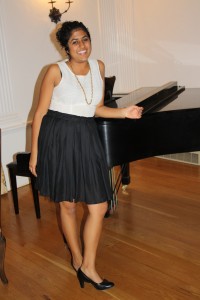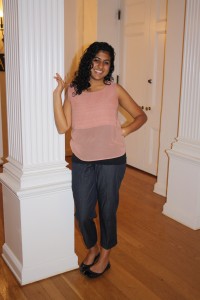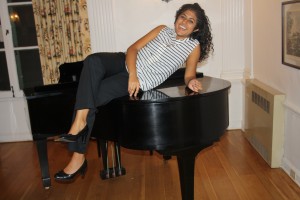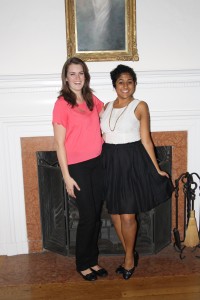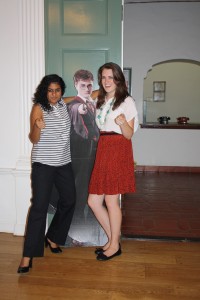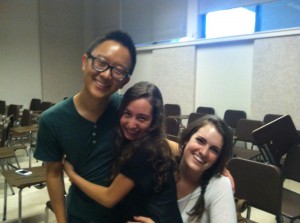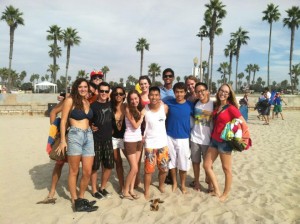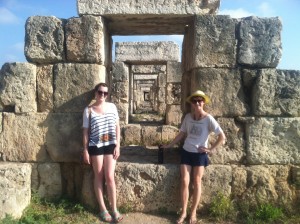For this week’s blog post, my friend and fellow blogger Poonam and I had a photoshoot highlighting different outfits for interviews and the workplace and talked with each other about our experiences around work attire . Our good friend Harry made a guest appearance. Enjoy!
B: Describe your outfit choices and for what situations or occasions they would be worn.
P: The black skirt/ white top combination is what I like to think of as a perfect work party outfit—I feel like there are frequently social events for staff outside of office where you have a little bit more liberty with your outfit choice. While it is a great opportunity to ditch the corporate wear momentarily, you still want to be mindful of how you present yourself. The flowy skirt in this outfit really jazzes things up and makes the outfit fun but still appropriate.
I really like the peach top, Capri pants, and flats combination for one huge reason: COMFORT. I know friends who have felt social pressure at work to wear heels, but personally I don’t last more than a few hours before collapsing. There are so many tiring aspects of working a long day—your outfit just shouldn’t be one of them. This example is great for jobs where you’re on the move and being seated isn’t really an option. I know this summer, when I would be overseeing and scrambling after events on campus, this type of outfit was my savior. I looked put together AND my feet were still intact at the end of the day.
The last outfit (striped top, black pants, heels) is “the Classic” work outfit. Not much to say about it besides the fact that it is wonderfully appropriate in the traditional sense of work attire—classy, professional, and mature. Throwing on a black blazer completes the look and gives the entire outfit an extra edge.
B: I’m a student and don’t have a lot of money to spend on professional attire. How do I stay cost effective and cute?
P: Sales! Every article of work clothing I own is from the sale section of a department store. Just have to be a determined and persistent shopper. Places like Ross and Target are also incredible for decently priced work attire. Moreover, I have found that having two pairs of pants and a skirt is totally sufficient for many combinations of outfit bottoms—it’s all about the mixing and matching.
B: Halloween is around the corner—what the scariest clothing mishap you’ve ever had?
P: Nothing too horrendous that I can think of; the worst was one day this summer where I tumbled down the stairs of Steele in my heels and then had to put them back on to meet a client. My ankle was throbbing and I couldn’t exactly stand straight. It was a bit embarrassing to be wobbling around– but all is well that ends well, right?
B: Besides getting dressed, what’s the most intimidating part of an interview?
P: The questions you didn’t see coming. I’m always afraid about the questions not really related to the position but more like “If you could go back in time and meet one person, who would it be?” I usually go into an interview feeling prepared and confident about the position itself and my qualifications, but for some reasons, questions like this that put you on the spot to be creative tend to throw me off a bit.
B: In an ideal world, what would your work attire be?
P: Relaxed and comfortable. I don’t particularly love dressing like Condoleezza Rice on a daily basis (too much effort and planning), so a work environment that embraces the contemporary business/ semi-professional look would be super ideal. I would be thrilled with a job where dark wash jeans were perfectly acceptable!
Dear Readers, What do you think about these outfits? Would you wear them to work or to work related events? Have a great week everyone!

